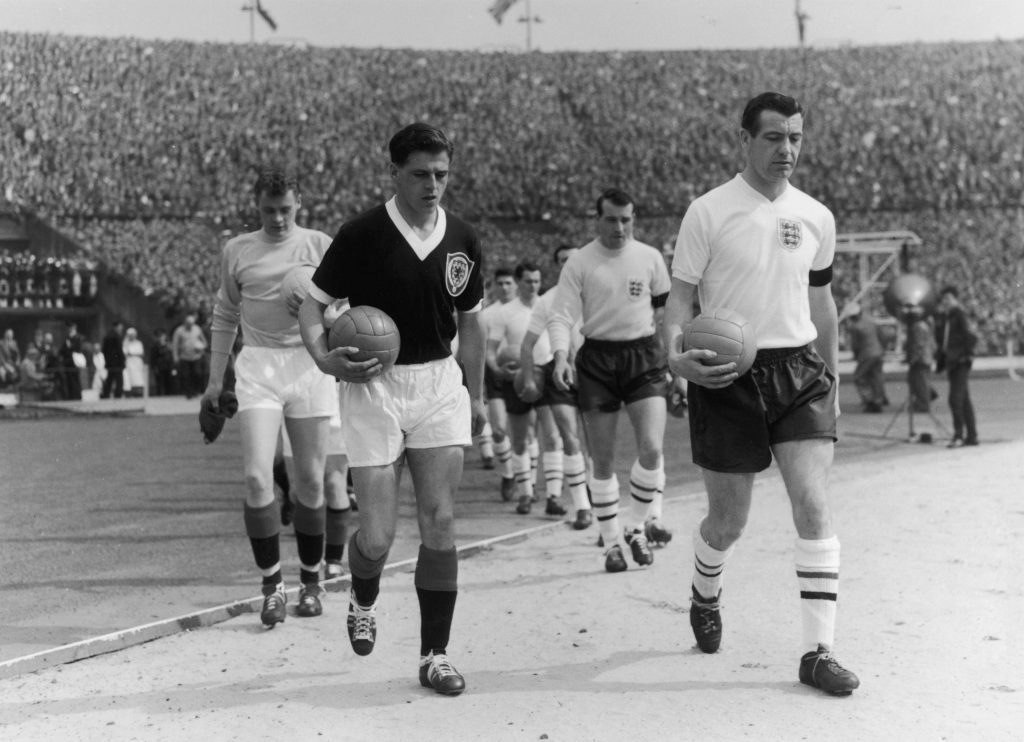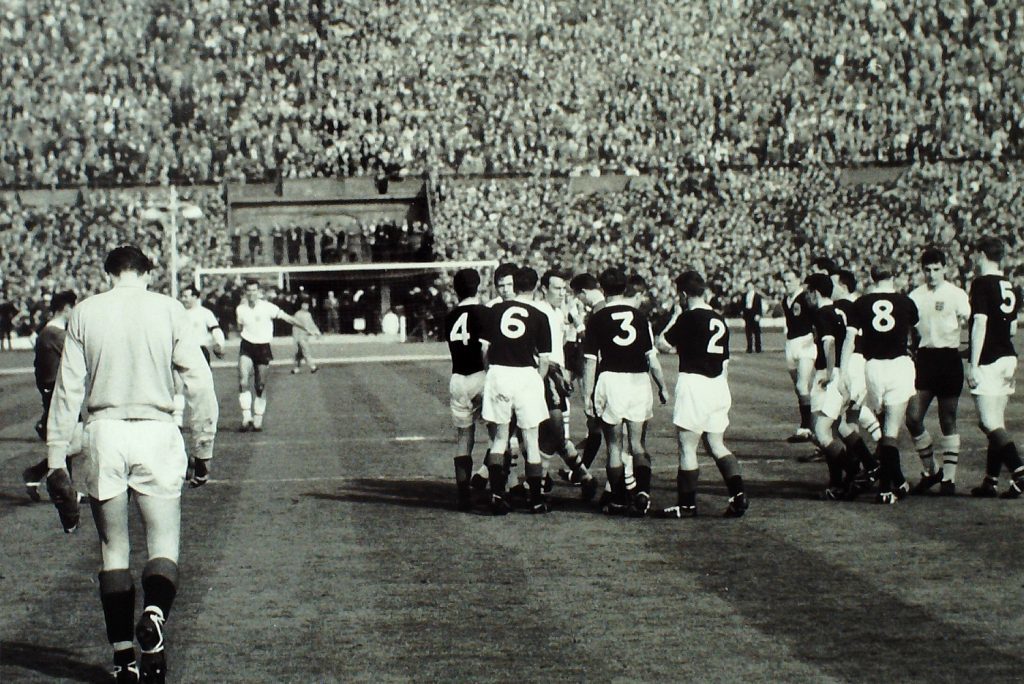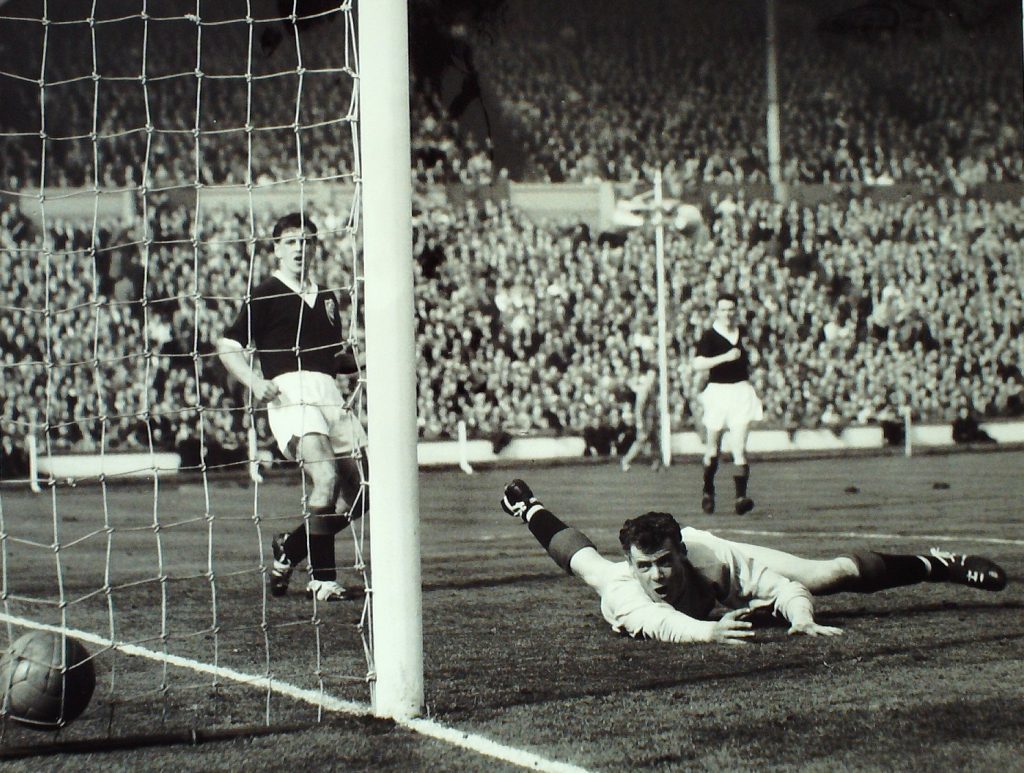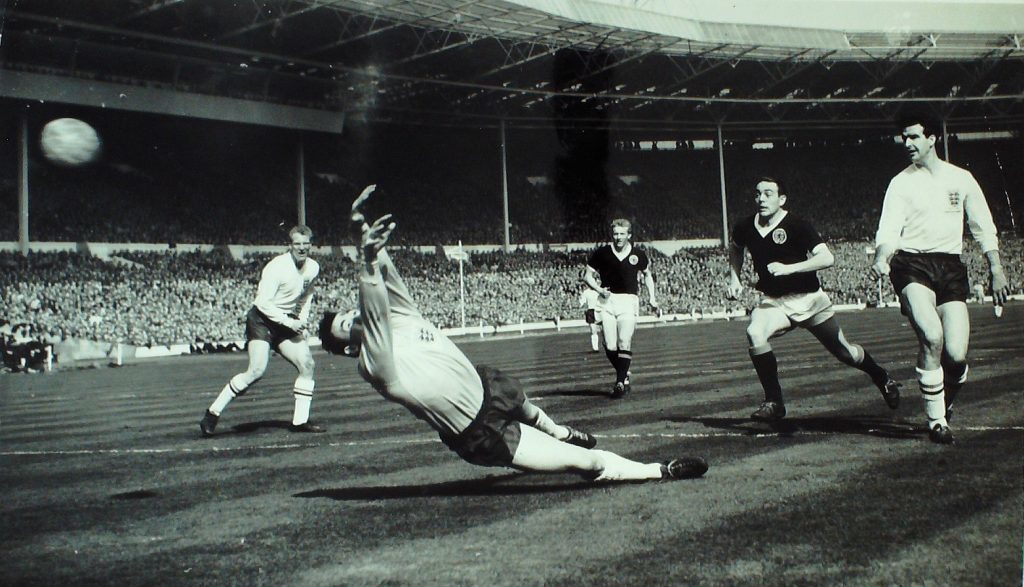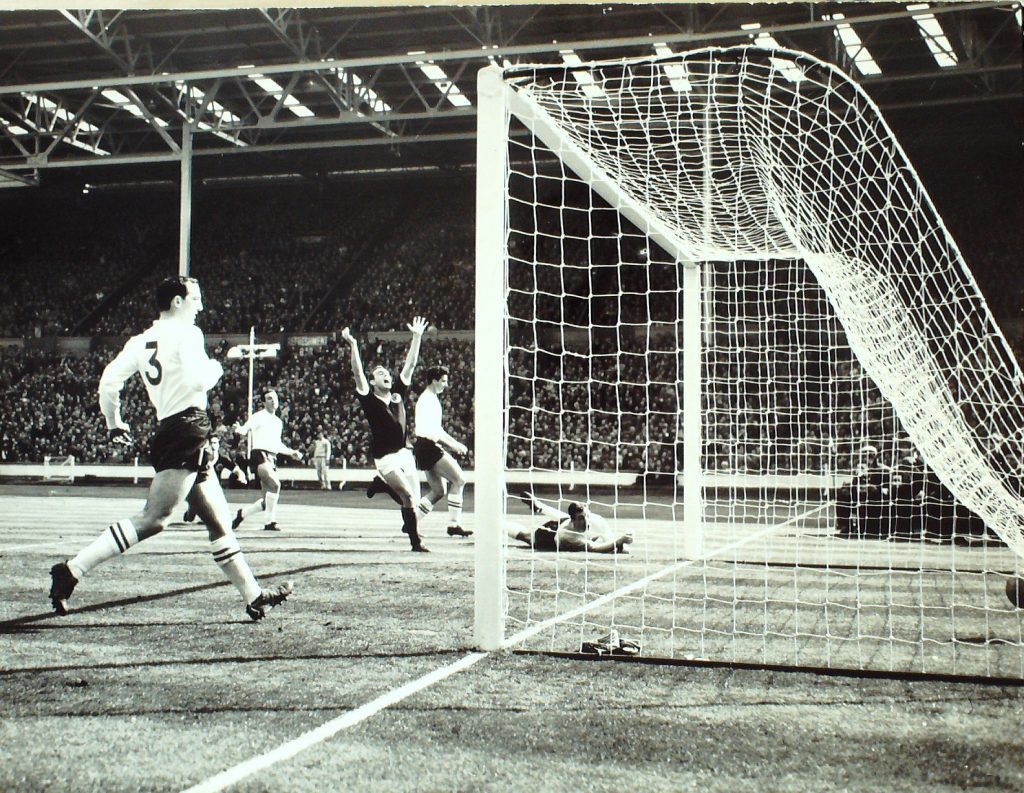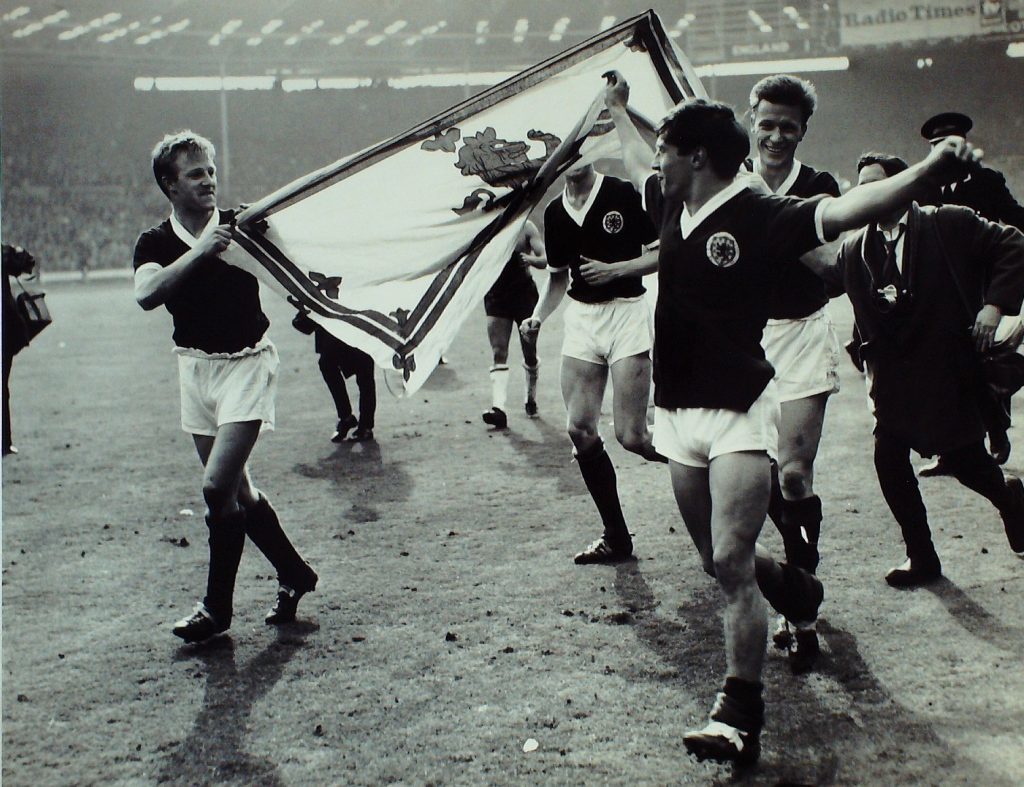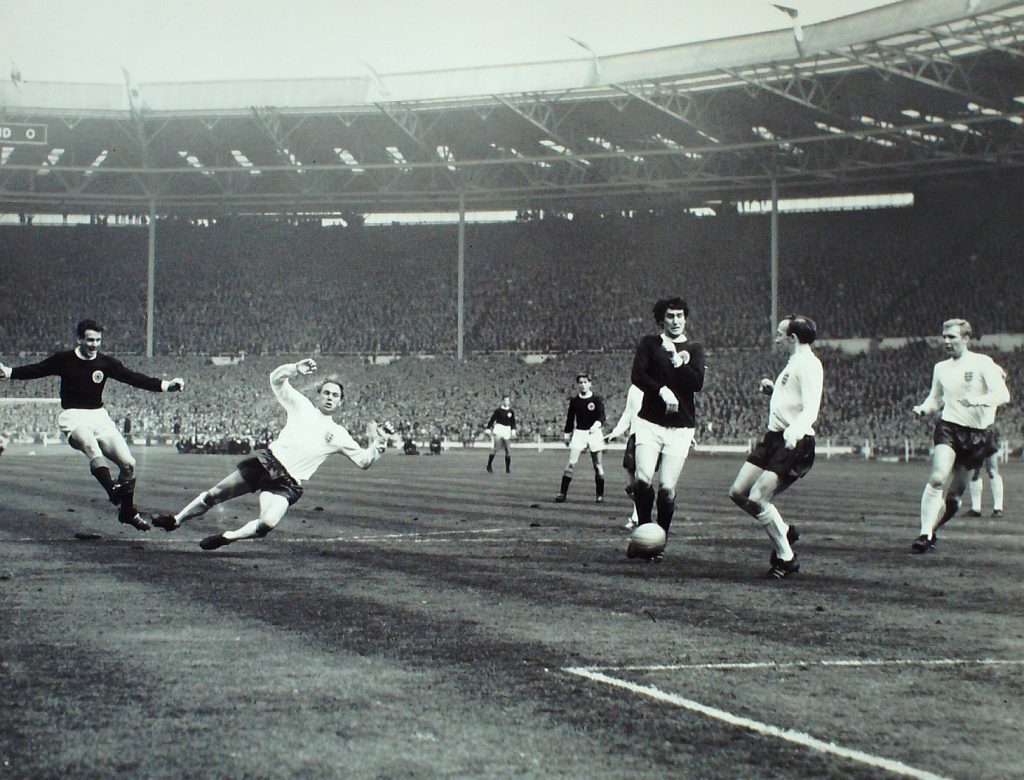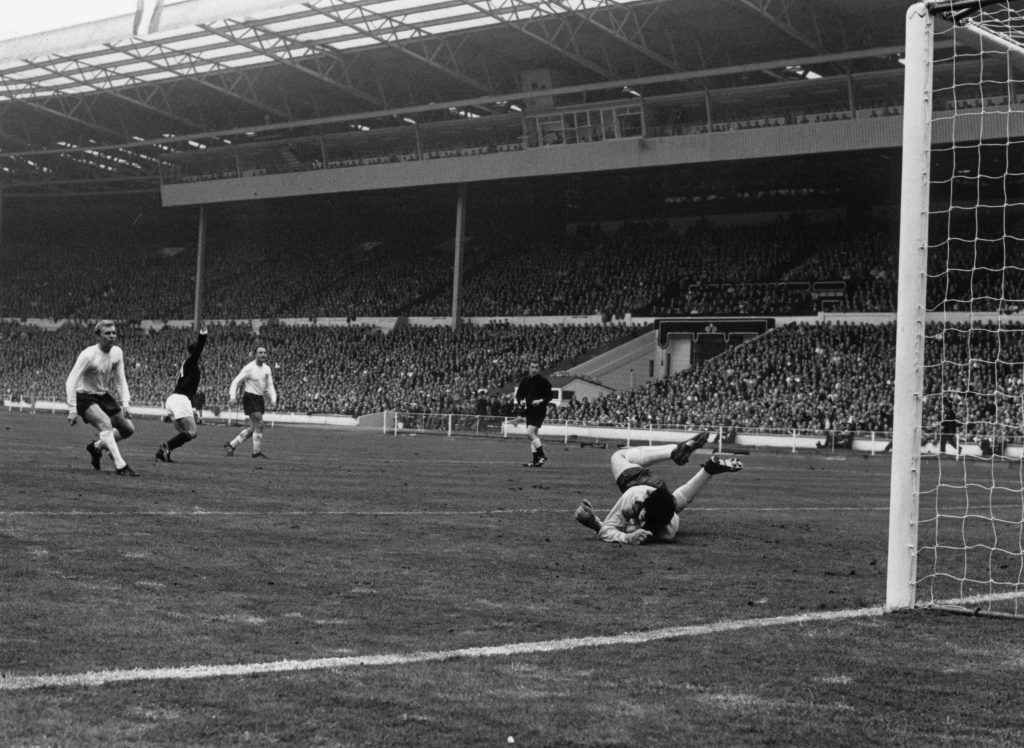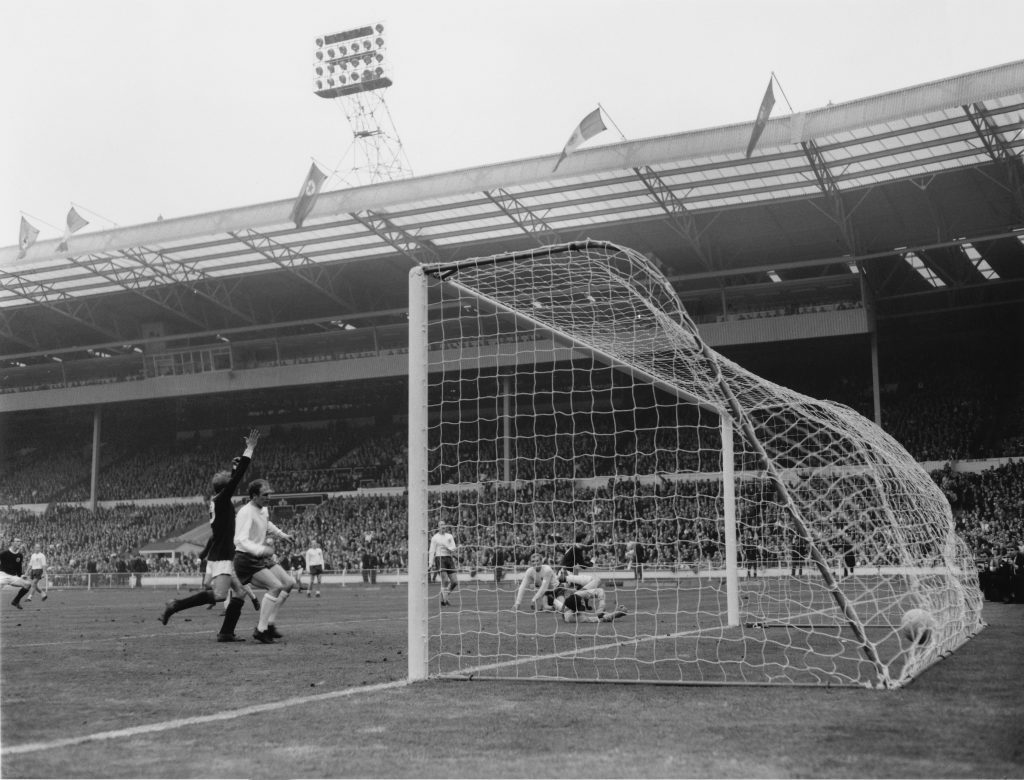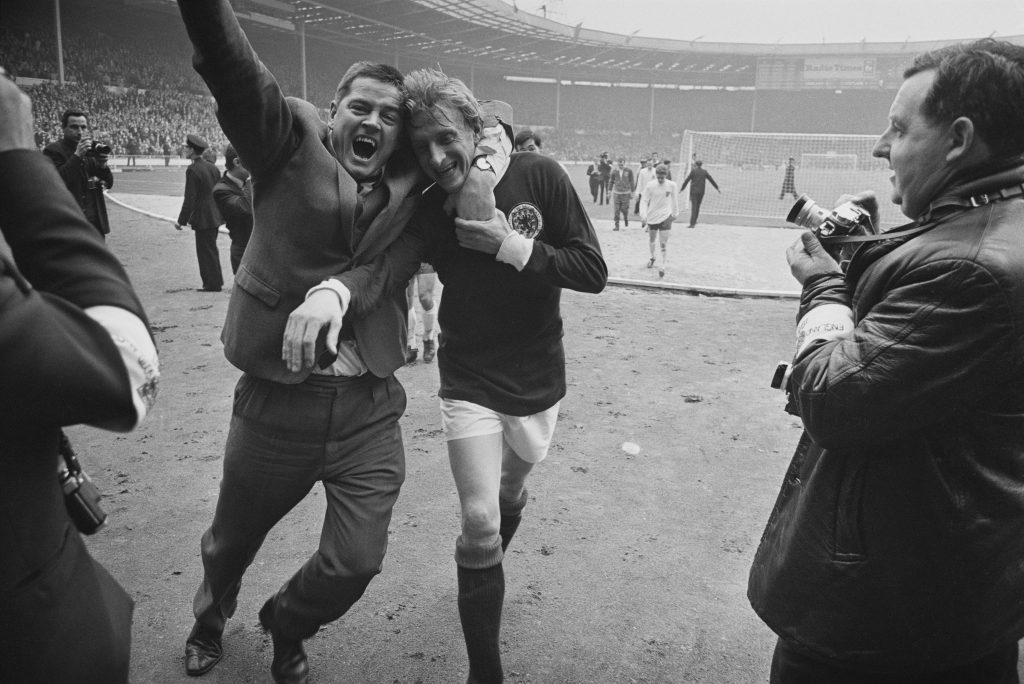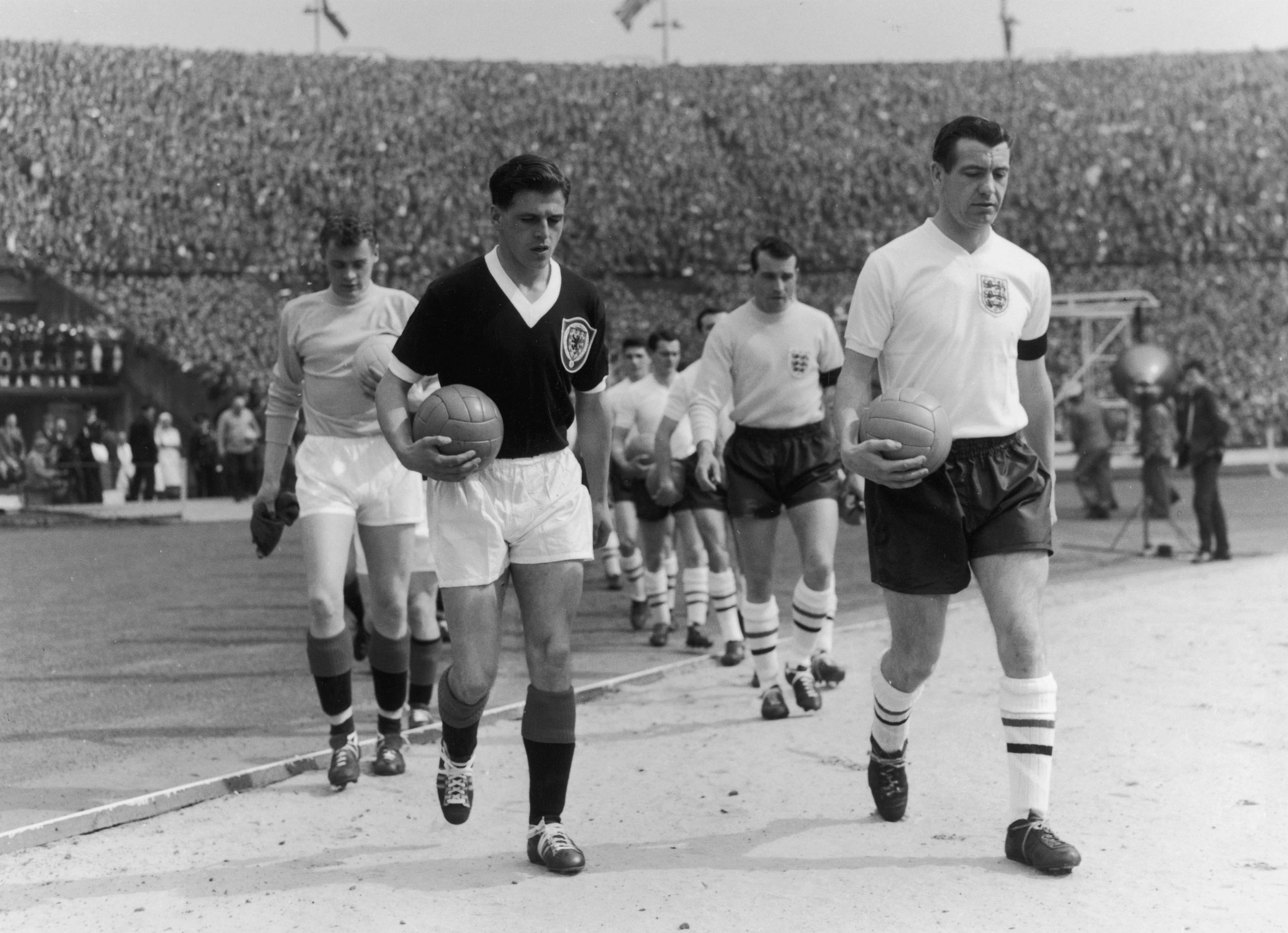
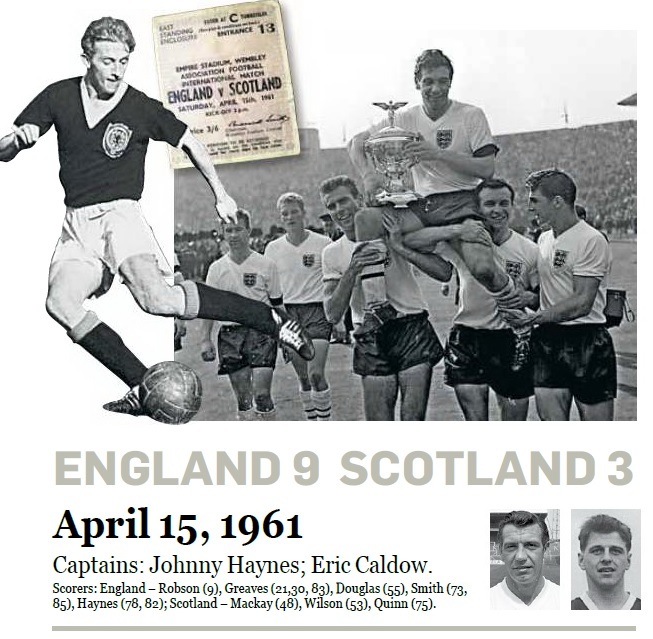
Frank’s songs stunned Law
SCOTLAND had endured 10 years without a win over England when they headed for Wembley in 1961, and the world had changed in that time.
Queen Elizabeth II had succeeded King George VI on the throne, Elvis Presley had the music scene all shook up and the Russians had just launched the first man into space.
It’s fair to suggest Yuri Gagarin’s 108-minute orbit of planet Earth was a whole lot more comfortable than the 90 minutes Frank Haffey was about to endure.
The Celtic keeper had made his Scotland debut 12 months earlier, when only a Bobby Charlton penalty got the better of him in a 1-1 draw at Hampden.
Airdrie’s Lawrie Leslie took up the gloves after that, and it was only after he got injured a week before the trip to London that Haffey was recalled.
Legend has it that his sister feared the worst about Frank heading for the bright lights of London, and that she locked him in a bedroom at the family’s Glasgow tenement in an attempt to prevent him travelling.
But it was a ground-floor flat and Frank escaped out of a window to travel south to meet his destiny.
Scotland had suffered a few beatings at the hands of the Auld Enemy down through the years, but nothing like what unfolded that April afternoon.
Denis Law, whose record against England at Wembley was actually better than at Hampden, takes up the tale.
“It might sound strange, but for a long time we were holding our own in the game,” he recalled.
“We were three down at half-time, but soon got it back to 3-2 after the interval with goals from Dave Mackay and Davie Wilson.
“But then Frank had a bit of a nightmare. Pat Quinn got it back to 5-3, but from there it was boom, boom, boom, boom and we were left embarrassed.
“Not that you’d have known it if you’d seen Frank in the bath after the game. He was singing his head off, like it was us who’d won 9-3.
“I went home to Manchester, and I don’t think I crossed the door for a fortnight.”
By comparison, the following day, Haffey was happy to be photographed under the sign for Platform 9 at King’s Cross Station.
The keeper’s attempts to laugh off his disappointment weren’t appreciated by the travelling support.
But his afternoon of infamy did add humour to ancient rivalries, with Rangers fans keen to tell Celtic supporters that the time was “nine past Haffey” or that they would be “home before 10”.
Haffey never played for Scotland again, and four years later headed forAustralia, not as some would have had it, as a conscript, but for a new life.
He dabbled in cabaret and television, once appearing in a Second World War drama that featured a young Russell Crowe.
Denis Law, meanwhile, would go on to enjoy famous wins at Wembley in 1963 and 1967, and become the country’s all-time leading goalscorer – 30 in 55 appearances – a record he shares with Kenny Dalglish.
Three of them came against the Auld Enemy, and you can still detect The Lawman’s huge pride in that.
He said: “Playing for Scotland was a big thing for me. Playing against England was bigger and scoring against them was huge.
“It might seem odd to look at the record books and see that after that absolute doing in 1961, we won our next three meetings with them, and lost just once between 1962 and 1968.
“But we had some great players – Jimmy Johnstone, Dave Mackay, John White, Billy McNeill, John Greg and, of course, Jimmy Baxter.
“In fact, it’s fair to say that if we’d played against England in every international, Scotland might have won the World Cup.”
As it was, that fell to England in 1966 – but Denis was otherwise engaged on the afternoon of the Final against West Germany.
“I had a game of golf to play against Hogan,” he revealed. “Not Ben, but John Hogan, a good mate.
“My Manchester United team-mates in the England side that afternoon, Sir Robert (Charlton) and Nobby Stiles, couldn’t believe it.
“But they knew from playing against me in Scotland-England games just how patriotic I was.
“I gave them a hard time, and wasn’t afraid to kick them – but we would then have a beer in the bar later.
“Looking back to 1961, I don’t recall feeling like I wanted to buy Frank Haffey a drink!”
By David Walker
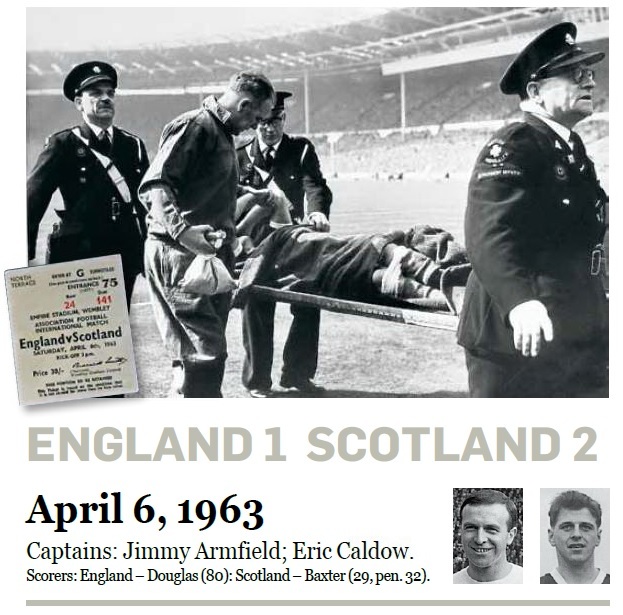
Gunners fans craved Slim Jim
THERE can be few greater tributes to a Scotland player’s performance at Wembley than the one which came Jim Baxter’s way in 1963.
After he had scored twice to help Scotland to a famous 2-1 victory, fans of one of England’s biggest clubs organised a petition to get him signed up.
He was a Rangers star at the time, but a group of Arsenal supporters believed his talents were being wasted up north, and they put pen to paper in an attempt to persuade Billy Wright, the Gunners boss of the time, to place a bid.
That it never happened was possibly down to Slim Jim’s lively off-the-field reputation.
Indeed, it would be another two years before his shenanigans snapped the patience of Ibrox boss Scot Symon, and he was sold to Sunderland for £72,500, with a nagging undercurrent of what might have been.
What is sure is his display in a Scotland team reduced to 10 men early on after skipper Eric Caldow had his leg broken in a collision with England’s Bobby Smith, was the greatest of all time.
“We needed Jim’s magic that day because it was a hard shift for us after Eric went off,” recalled Davie Wilson, who was moved from outside-left to
emergency full-back.
“While we were always going to scrap for the result – this was Scotland versus England, after all – you need someone to give you that something extra.
“And Jim did that, nicking possession to run through and beat Gordon Banks (who was making his international debut) for the first.
“Then, when Ron Flowers took down Willie Henderson in the box to give us a penalty, Jim kept his cool to calmly convert and ensure the win.”
As Wilson, a Rangers team-mate at the time revealed, he himself could have had a bigger part to play in the win had Baxter found his nerve failing him.
“As well as being our skipper, Eric was our penalty taker,” he said.
“So that meant when the referee pointed to the spot, we had a decision to make.
“I was covering Eric’s position, and I would certainly have stepped up to take the penalty as part of my job.
“You either feel confident in these situations or you don’t, and I would certainly have backed myself.
“As it turned out, I never got the chance because Jim took the responsibility on himself.
“He was that kind of player. He knew how good he was and would do everything he could to contribute.
“Any victory over England is a big deal, but do to it in those circumstances – at Wembley and having lost Eric the way we did – just made it extra special.
“We always carried huge supports to these games, and you would take a great deal of pleasure in knowing you had helped make so many people’s weekend.”
That said, Wilson didn’t celebrate the success in quite the same fashion as the rest of the Scotland squad.
“I am a teetotaller, always have been, so I didn’t end up on the champagne as some of them did,” he said.
“To be fair, though, I think that probably made me the exception to the rule!
“London the night after a Scotland win was never short of parties, and the lads were as likely to take advantage as the supporters were.
“Just being involved was enough for me. We had beaten a strong England team, a starting line-up which, as well as Gordon Banks, featured Bobby Moore, Bobby Charlton and Jimmy Greaves.
“And Alf Ramsey, the man who would lead them to their World Cup win in 1966, had not long taken over as their manager.
“So you are talking about some of their biggest-ever names, people who went on to contribute to their greatest-ever win – and we beat them with 10 men.
“That is something to be proud of.”
Wilson was out of the side by the time Baxter performed his famous keepie-uppie at the ground in the “world championship-winning” success of 1967, and it brought an even bigger smile to his face.
“That was Jim, for you,” he said with a laugh. “He was a genius out on the football park and he knew it. I was privileged to have played alongside him.”
By Danny Stewart
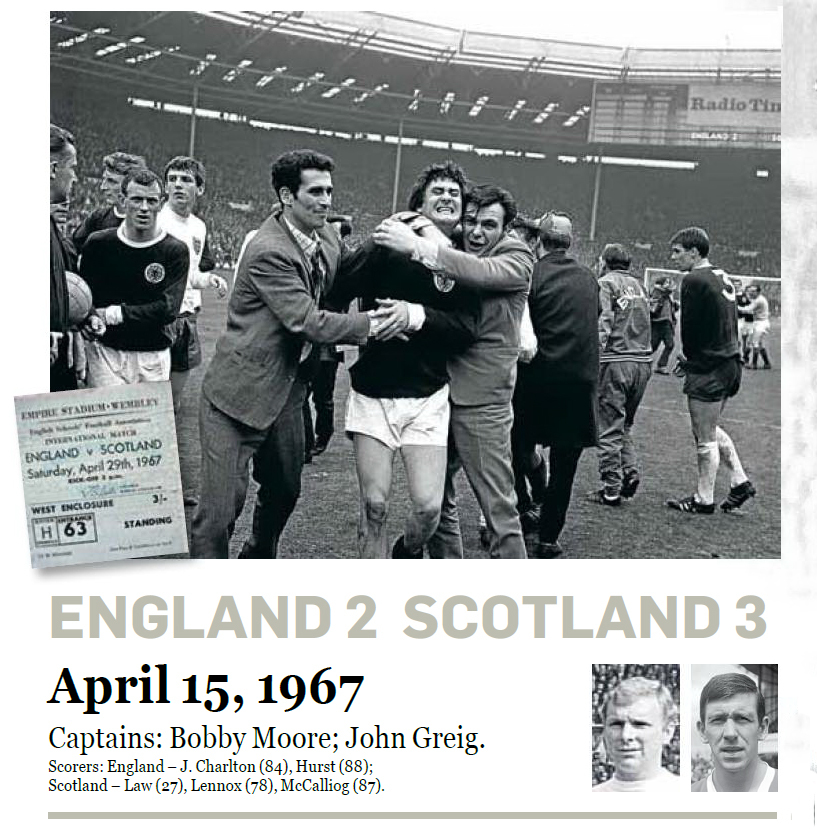
Bobby’s heroes humbled the world champs
THE day Scotland defeated England’s “World Champions” in 1967 will be celebrated for as long men play football in dark-blue shirts.
England were on an unbeaten run of 19 games and fielded 10 of the players who had won the World Cup less than a year before.
Alf Ramsey’s men were 4-1 on to defeat the visitors.
Scotland had three debutants.
Celtic goalkeeper Ronnie Simpson collected his first cap at the age of 36 and 20-year-old Jim McCalliog of Sheffield Wednesday was picked to play in midfield.
It was also manager Bobby Brown’s first game in charge.
What a start he had.
Scotland didn’t just beat England, they dominated from start to finish.
Denis Law, Bobby Lennox and Jim McCalliog were on target for the Scots, with Jack Charlton and Geoff Hurst scoring in reply.
The game will forever be remembered for the sight of Jim Baxter cheekily playing keepie-uppie on the Wembley turf.
Scotland were by far the superior team and he didn’t want anyone to forget it.
Bobby Brown, now 93-years-old, was sure he had a team that could beat England that day.
He recalled: “Although England were the World Champions, I felt strongly that there was no need for us to have any feeling of inferiority.
“We had household names in our side.
“Our 4-3-3 formation was designed to take the game to England.
“I have always believed the Scotsman can rise to the occasion, regardless of the opposition.
“I believed it then and I still believe it now.”
Here Brown looks back at the team he picked for that famous Wembley triumph in 1967.
RONNIE SIMPSON
People are amazed to hear he was my ball boy when I was the Queen’s Park goalkeeper.
I needed a reliable goalkeeper who would come in and be able to cope with the pressure of a high-profile match.
TOMMY GEMMELL
Tommy could play equally well on the right or left and I decided to use him as left-back to accommodate Eddie McCreadie.
He was strong, committed and would run through a brick wall for the team.
EDDIE McCREADIE
Eddie was a full-back ahead of his time. A good tackler and very mobile. He rarely wasted the ball when moving it forward.
JOHN GREIG
The man I picked as my captain. An inspirational figure who always gave 100% whether he was playing for Scotland or Rangers.
He was perfect to lead us in such a huge match.
RONNIE McKINNON
Formed a great partnership with his Rangers’ team-mate John Greig.
He struck me as being quieter on the field than his partner but he was mobile and a very reliable defender.
JIM McCALLIOG
I earmarked him as the lynchpin of the team.
I had watched him playing for Scotland Under-23s earlier that year and had no doubts about giving him his first full cap.
I wanted to play him in the middle of a 4-3-3 because he could get forward and also come back to help the defence if required.
JIM BAXTER
Jim could run a game. Even if things were going against him he would produce a bit of magic. He was full of skill going forward.
Baxter was always brimming with self-belief, as could be seen by him doing that keepie-uppie at Wembley.
BILLY BREMNER
Billy was strong, aggressive player who led by example. He would keep running for the entire 90 minutes and never stopped snapping at ankles.
He could always be relied on to show amazing commitment.
WILLIE WALLACE
I had wanted to play Jimmy Johnstone on the right but had no worries about playing Wallace when Jimmy was injured. He was scoring goals for fun at Celtic and I was sure he could play on the wing and carry a goal threat.
DENIS LAW
Denis suffered a number of injuries that affected his Scotland career but I was delighted to have him fit. I wanted him to play right on top of Bobby Moore and Jack Charlton.
He never give the England defence a moment’s peace.
BOBBY LENNOX
Bobby was a great runner. He was quick and would happily take on a full-back as well as being good for a goal.
He was a great asset for a team that was determined to attack England.
By Brian Fowlie
<The Early Days | The 1970s & 80s >

Enjoy the convenience of having The Sunday Post delivered as a digital ePaper straight to your smartphone, tablet or computer.
Subscribe for only £5.49 a month and enjoy all the benefits of the printed paper as a digital replica.
Subscribe